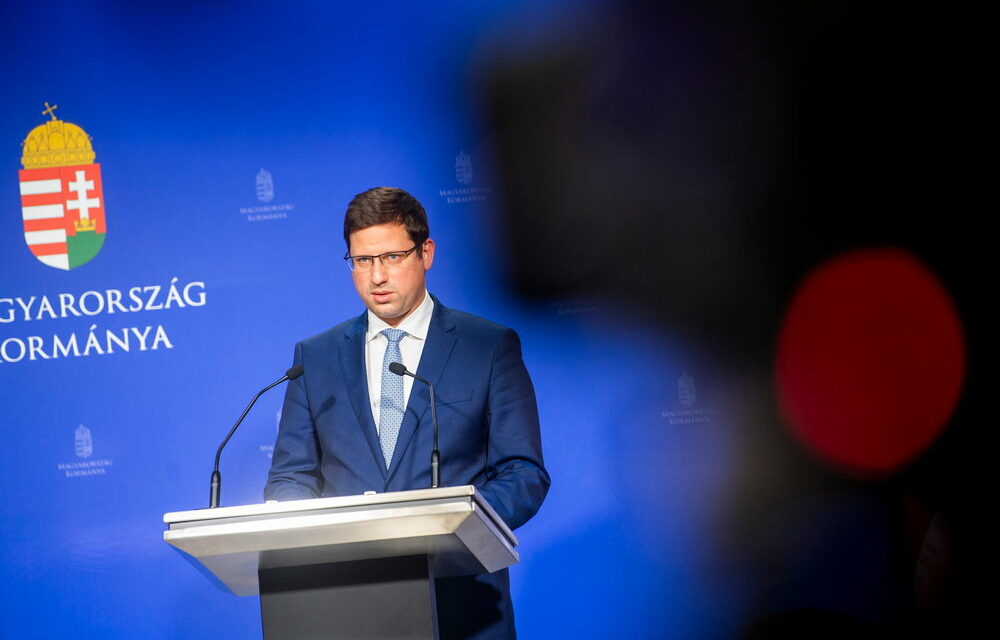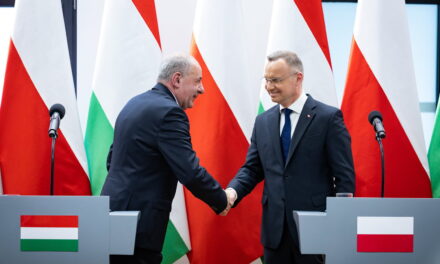The biggest negative of the EU regulation on the mandatory migrant quota is that it imposes migrants on Europe, Hungary and the Hungarian people, and sends an invitation to millions of migrants, said the minister in charge of the Prime Minister's Office in Budapest on Thursday.
Gergely Gulyás explained: at Wednesday's government meeting, the Prime Minister gave information about the main events of last week's European Union summit.
He said: the decision made in the Council of Ministers on migration is contrary to the earlier agreement between the heads of state and government, according to which unanimous decisions will be made on the issue of migration. Therefore, the Hungarian government did not agree to the decision that would have confirmed the decision made in the Council of Ministers at the level of the European Council.
Gulyás emphasized that the draft legislation is not only about mandatory quotas and resettlement, but also that Hungary should process at least 10,000 refugee applications every year. And for this, they should be allowed into the country, reception camps should be created for them, he said .
"By observing the processes in Western Europe, it can be seen that these reception camps to be established according to the EU regulations would easily become migrant ghettos and cannot be closed according to the regulations. This has a very serious public safety and public health risk," he added, stating that the idea of these internment camps is equivalent to tearing down the fence, because anyone who submits an asylum application at the border should be allowed into the territory of the country.
The minister said: All responsible governments of Central Europe, "where the societies are still free from all the consequences that come with migration", must do everything to prevent "this completely senseless and crazy regulation" from entering into force. That is why the Hungarian Prime Minister did not allow the heads of state and government to adopt a joint statement at the European Union summit.
"The opinion of the Polish Prime Minister was also the same as ours, and there were many countries that agreed in principle with the Hungarian position, only after there are a lot of migrants in their territory - for example Italy - they come to a different conclusion. It is in their interest to take those who are with them away from them," the minister pointed out.
The head of the ministry also spoke about the fact that amending the EU budget requires unanimity, so there is no realistic chance of the proposed amendment being accepted.
He announced: Brussels has requested an additional payment of 98.5 billion euros from the member states, which is fifteen times the amount of all Hungarian annual SJA payments, roughly the amount of the entire annual Hungarian state budget. According to Gulyás, several issues need to be clarified, such as what Brussels spent the money on, since there should be more money, not less, as Poland and Hungary have not yet been given a single penny. In addition, countries that have received the recovery fund complain that payments are slow.
He emphasized: Based on Brussels' request, 50 billion euros would go to Ukraine, and the European Commission wants to finance interest expenses, spend it on migrants, but not on border protection, and in fact, one and a half billion euros would go to raise the salaries of the Brussels bureaucracy. Hungary cannot agree to this, and since amending the budget requires unanimity, there is no realistic chance of accepting such an amendment.
Gergely Gulyás said that Brussels makes countless demands on Hungary in the economic field as well, this is also true for the recovery fund and the European semester, which is a system that qualifies the economic governance of the European Union member states.
He added: among the recommendations made to Hungary in the European Semester is the abolition of official energy prices, i.e. the abolition of utility reduction, and Hungary must also examine family, education and healthcare expenses.
He said that Hungary will carry out these investigations, but "there can be no question of reducing family allowances and absolutely no possibility of canceling the utility reduction".
He went on to say that it is true that health care expenses have increased, since the salaries of doctors and nurses were raised in the previous cycle to an extent that had never been seen since the regime change. The government also wants to take a similar step in education, where the EU could take over 12-13 percent of the cost of the wage increase undertaken until 2030.
He added: if they get there, there will be a quick, significant salary increase for the teaching staff, the average teachers' salaries could reach eight hundred thousand forints in a year and a half, and one million forints by the end of the government cycle, and by 2027 at the latest.
He asked that neither the left-wing MEPs – who earn a net amount of six million forints per month in euros in Brussels – nor their factions obstruct access to EU funds, and even call on the committee to, in accordance with the agreement in the operative program, from September this year at the latest let Hungary take the first big step.
The minister said that the Hungarian budget would cover 87-88 percent of the teacher salary increase until 2030, and there is no question that Hungary would finance the teacher salary increase mainly with European Union money.
He said that there will be a teacher salary increase even without EU funds, the government is unmoved, but it would be crucial in terms of scale and speed if the members of the European Parliament of the Hungarian left did not attack the Hungarian government.
Gergely Gulyás reported on the recent government decree which ordered the transfer of HUF 169 billion to the overhead protection fund, which is the state contribution to the current overhead payments.
According to his description, more than HUF 132 billion of this is the allowance paid to hospitals, schools, and regional public administration institutions. In public education, 11 billion for the compensation of church administrators, and nearly one billion forints for the support of minority self-governing administrators performing public education tasks.
This also shows how much of a burden it is for the country to provide for the increased energy costs due to the war and the sanctions responses to it, but the budget is capable of this.
The minister did not want to speculate about the potential bankruptcy of the capital city and the related consequences, stressing that they expect that Budapest will not go bankrupt, and just as 3,199 local governments, which are poorer than the capital city, are able to fulfill their public duties, so the richest one will be able to do so as well.
According to Gergely Gulyás, it would be worthwhile for the city administration to think about a new "bankruptcy trustee".
Speaking about the approximately half a billion HUF worth of support provided to Gergely Karácsony's movement in the election campaign, the minister stated: it is clearer than ever that Gergely Karácsony was involved in a money laundering case in connection with his own campaign support. It is assumed that the laws were not followed, so the matter must be clarified.
He also said: there is a person who has a minimal income and no substantial savings, yet pays more than HUF 500 million in support, mostly in euros, to a movement that does not collect donations. It is a question of where this money came from, who gave it, what it gave it to, and what he expected in return: all this must be clarified by the capital, he said. He added: the authorities must reveal what happened, in any case, there are very strict anti-money laundering rules in force in Hungary.
The Hungarian government wishes the French cabinet to become the master of events in its country as soon as possible, to restore public peace and order as soon as possible - the minister responded to the question about the riots in France. He added that although it is possible to draw more far-reaching conclusions about how the current social tension developed, the government analyzes it only to the extent of preventing the development of similar ones in Hungary. This is also why the cabinet is taking action against migration.
In response to the suggestion that, according to some claims, Germany would need 1.5 million immigrants annually due to the labor shortage, he said: concepts are mixed in European refugee policy due to the huge demand for guest workers.
They also often speak of those who are not persecuted by anyone, who come to Europe only in the hope of a better life, as refugees, and also of those who, although persecuted, come from a distant country, so they would be entitled to help in the first safe country.
All countries have the right to accept guest workers, but there are no humanitarian considerations behind this.
MTI













